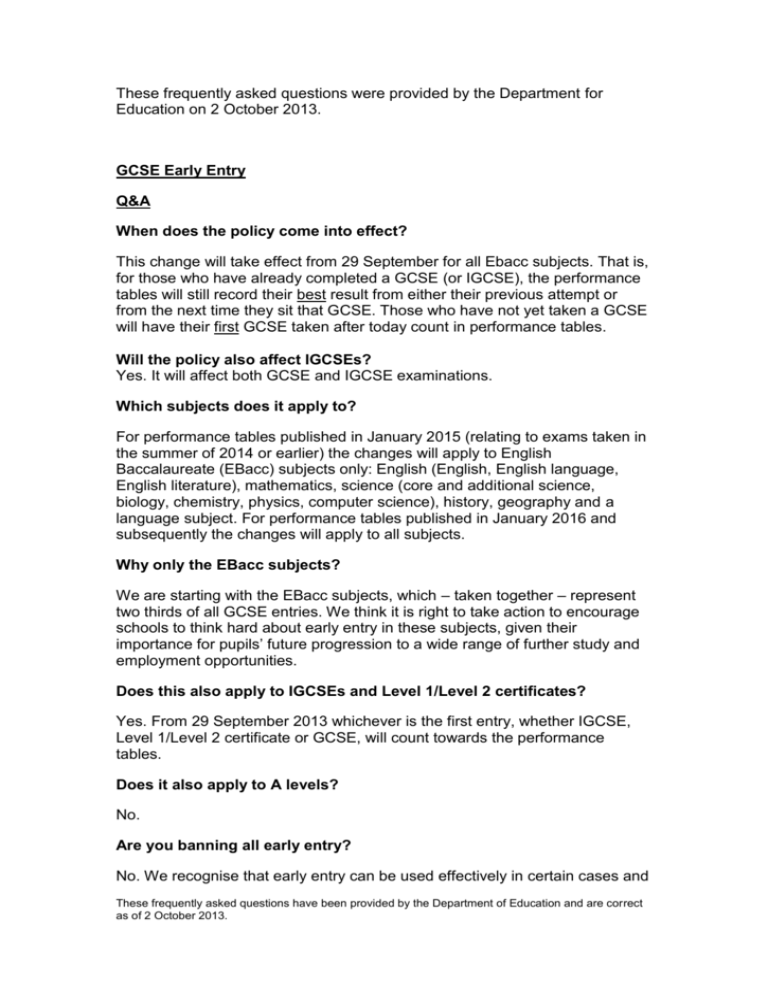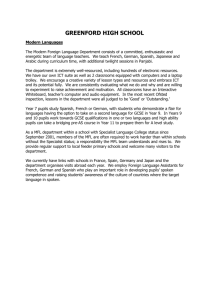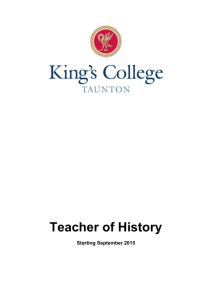These frequently asked questions were provided by the
advertisement

These frequently asked questions were provided by the Department for Education on 2 October 2013. GCSE Early Entry Q&A When does the policy come into effect? This change will take effect from 29 September for all Ebacc subjects. That is, for those who have already completed a GCSE (or IGCSE), the performance tables will still record their best result from either their previous attempt or from the next time they sit that GCSE. Those who have not yet taken a GCSE will have their first GCSE taken after today count in performance tables. Will the policy also affect IGCSEs? Yes. It will affect both GCSE and IGCSE examinations. Which subjects does it apply to? For performance tables published in January 2015 (relating to exams taken in the summer of 2014 or earlier) the changes will apply to English Baccalaureate (EBacc) subjects only: English (English, English language, English literature), mathematics, science (core and additional science, biology, chemistry, physics, computer science), history, geography and a language subject. For performance tables published in January 2016 and subsequently the changes will apply to all subjects. Why only the EBacc subjects? We are starting with the EBacc subjects, which – taken together – represent two thirds of all GCSE entries. We think it is right to take action to encourage schools to think hard about early entry in these subjects, given their importance for pupils’ future progression to a wide range of further study and employment opportunities. Does this also apply to IGCSEs and Level 1/Level 2 certificates? Yes. From 29 September 2013 whichever is the first entry, whether IGCSE, Level 1/Level 2 certificate or GCSE, will count towards the performance tables. Does it also apply to A levels? No. Are you banning all early entry? No. We recognise that early entry can be used effectively in certain cases and These frequently asked questions have been provided by the Department of Education and are correct as of 2 October 2013. schools will continue to be able to enter pupils early for examinations where they feel it is appropriate. What is the evidence that early entry is a problem? Data published by the Joint Council for Qualifications (JCQ) this summer showed a marked increase in early entry in mathematics and English GCSEs in particular: between 2012 and 2013 early entry in English and English language (to 11% in English and 10% in English language) increased by three percentage points, and in mathematics by five percentage points (to 23%). While some pupils may well be ready to achieve a good grade in the subject before the end of year 11, there is no evidence that such a high proportion of pupils can achieve well through early entry. Inappropriate early entry can lead to students having to re-take GCSEs, which in turn cuts into teaching time and leads to a focus on teaching to the test rather than developing a student’s understanding of a subject. JCQ data suggests that this is particularly a problem in mathematics: in the 2013/12 academic year over 94,000 year 11 pupils (15% of year 11 candidates) took mathematics GCSE at least three times. Evidence published by the Department for Education in 2011 showed that, statistically, pupils who enter early do worse than pupils who do not, even when taking prior attainment into account.1 A report by Ofsted corroborated many of these concerns, raising issues with the impact of early entry on students.2 Isn’t this going to disadvantage schools which have used early entry before the announcement was made? Could this mean they will be faced with intervention? Schools that have already used early entry will not be disadvantaged. Where pupils have already taken GCSEs (for example, in the summer of year 10), their best result from their previous attempt or from the next time they sit a GCSE (prior to the end of key stage 4) will count in performance tables. You’re making the announcement very close to the deadline for November 2013 entries. What should schools do? Where schools have made plans to enter pupils for examinations in November, we expect they will want to think carefully about whether to proceed. If a school is confident that early entry is in the best interest of its pupils, there should be no reason for entry plans to change. What about schools that have already paid their fees to the exam 1 2 Early entry to GCSE examinations, DfE, 2011 Schools’ use of early entry to GCSE examinations, Ofsted, 2013 These frequently asked questions have been provided by the Department of Education and are correct as of 2 October 2013. boards? Schools should contact their exam board to discuss withdrawing pupils from the examination where entries have already been made. Arrangements relating to fees are a matter for exam boards. Does this mean pupils won’t be able to re-take GCSEs any more? No. We are only changing the way in which we count qualifications in performance tables. Pupils will continue to be able to re-take GCSEs and to use their best grade to support applications to further education or employment. However, many changes have already been made to re-takes at GCSE level. GCSEs will be linear from now on and, with the exception of maths and English, students will not be able to re-take a GCSE until the following summer. But surely schools won’t support pupils to re-take if the result doesn’t count towards performance tables? We expect schools to act in the best interests of their pupils, both in their decision for whether to enter a student early and in their subsequent teaching of that student. If a pupil who was expected to achieve well through early entry has an unexpectedly poor result, we would expect schools to support that pupil to re-take the examination and to improve his or her grade. Isn’t introducing this in 2014 unfair? We will always look to act in the best interests of pupils. We think it is right to take swift action to tackle inappropriate early entry. Where schools are confident they are doing the right thing, there should be no reason for them to change their plans. What about pupils who are entered privately by their parents? Will their first entry still count? Currently all entries are taken into account in compiling performance tables, whether taken in the school or privately. We will confirm the precise details of how the new arrangements will work in due course. What happens if schools enter pupils for more than one GCSE in a subject in the same exam series? Where exams are taken at the same time, in the same series, the best result will continue to count. Schools will want to think carefully about whether this is in the best interests of their pupils. The Department for Education will continue to collect data on entry patterns, and will share that data at a school level with Ofsted. These frequently asked questions have been provided by the Department of Education and are correct as of 2 October 2013. What if a student takes an exam early with one board and then re-takes the exam with a different board? The first entry is still the result that will count. Swapping exam boards will not affect the way the policy is implemented. What about if a student takes GCSE English in November and then IGCSE English in the summer? The earlier of the two entries will count; this change applies to entries in the subject, rather than entries to a particular qualification. If a student gets an ‘X’ grade at first entry, will this be the result that is entered into performance tables? No. As is currently the case, ‘X’ grades do not count towards performance tables. If a student receives an ‘X’ grade and then re-takes the exam and achieves a grade, that is the grade which will be included in the performance tables. What happens in cases of exception discounting? Where qualifications are currently discounted against each other, the earlier of the two sets of results will be counted in performance tables. For example: A pupil takes English GCSE in November 2013 and English Language and English Literature GCSEs in June 2014: the November 2013 English result would count in performance tables A pupil takes English language GCSE in November 2013, re-takes it in June 2014 and takes English literature GCSE in June 2014: the November 2013 English language result would count alongside the June 2014 English literature result. These frequently asked questions have been provided by the Department of Education and are correct as of 2 October 2013.








